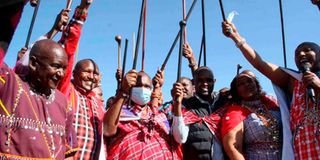2,000 youth to be feted as Maasai community rite of passage enters peak

Narok county governor Samuel Tunai (center with a mask on) during a ‘Ilmeshuki’ age-set ceremony for Loita Maasai on Thursday November 11, 2021 in Loita ward in Narok South sub-county.
Entasikira village in Narok South sub-county is a hive of activity as men aged between 25 and 40 congregate to celebrate the final stage of adulthood.
Over 2,000 men will undergo the meat-eating rite called olng’esherr, planned for November 20 to mark their entry into elderhood.
The ceremony will merge two Maasai age sets - the older ilmeshuki and the younger ilkinyaku - that will see them promoted to senior elders.
At the end of the ceremony, the two age sets will agree on their common name.
It takes six years for an age set to be named, making the difference between the youngest and eldest significant.
When they are initiated, they can marry off their daughters, circumcise their sons and attend all community meetings.
They will be eligible to inherit a share of their parents’ land, livestock and other property.
On the final day of the ceremony, an ox is sacrificed in the middle of the designated manyata (hut). The meat is given to the initiates and their spouses as a test of their morality, integrity and commitment to their age group.
Narok Governor Samuel Tunai, several Narok politicians and Maasai leaders from other counties have toured the manyatta and donated money and food.
The governor, who visited last Saturday, said the community should continue preserving its culture for posterity as it helps instil discipline in the younger generation.
“The positive traditional events like bringing two age sets together in a ritual unite the community and teach the younger generation good practices. They create a discipline where the young respect the elders and mark boundaries of each person in society,” said Mr Tunai.
“We in the older generation should not ignore talking to the younger generation about the values of our community. We should be the ones teaching them how to relate with the community and respect the authority and senior people in the society.”
The governor condemned outdated cultural practices like female genital mutilation and early marriages and teenage pregnancies, saying such practices were pulling the community down economically.
Build temporary huts
“The government has invested a lot of money in offering free primary education, building infrastructure and posting teachers in all parts of the country so that all children can equally get an education. I request you to take advantage of this and take your children to school,” he said.
All the seven Maasai clans in Narok County hold their celebrations on different dates and those participating build temporary huts where they remain for one to six months being taught their culture.
The seven clans are Purko, the largest, Ildamat, Kekonyokie, Loita, Uasin Gishu, Siria and Motialek.
Traditional chiefs, who are the presidents of the clans, are key in giving directions on how the celebrations will be conducted.
Politicians and Maasai leaders in and outside the county have been streaming into the Loita manyatta for the age-set ceremony for the past two weeks.
The ceremony is practised by Maasai communities in Kenya and Tanzania.
The politicians are using the ceremony as a perfect hunting ground for votes from the Loita clan.
Environment Cabinet Secretary Keriako Tobiko and Youth Affairs PS Charles Sunkuli were the first leaders to attend the ceremony.
Last week, Labour Chief Administrative Secretary Patrick ole Ntutu, in the company of Emurua Dikirr MP Johana Ngeno and over 16 MCAs, came to the area.
Those seeking to succeed Mr Tunai as governor include Mr Ntutu, PS Sunkuli and MPs Soipan Tuya (woman rep), Korei Lemein (Narok South), and Gabriel Tongoyo (Narok West).
Narok North MP Moitalel Ole Kenta is poised to join the race under the ‘handshake’ platform of President Uhuru Kenyatta and ODM leader Raila Odinga.





